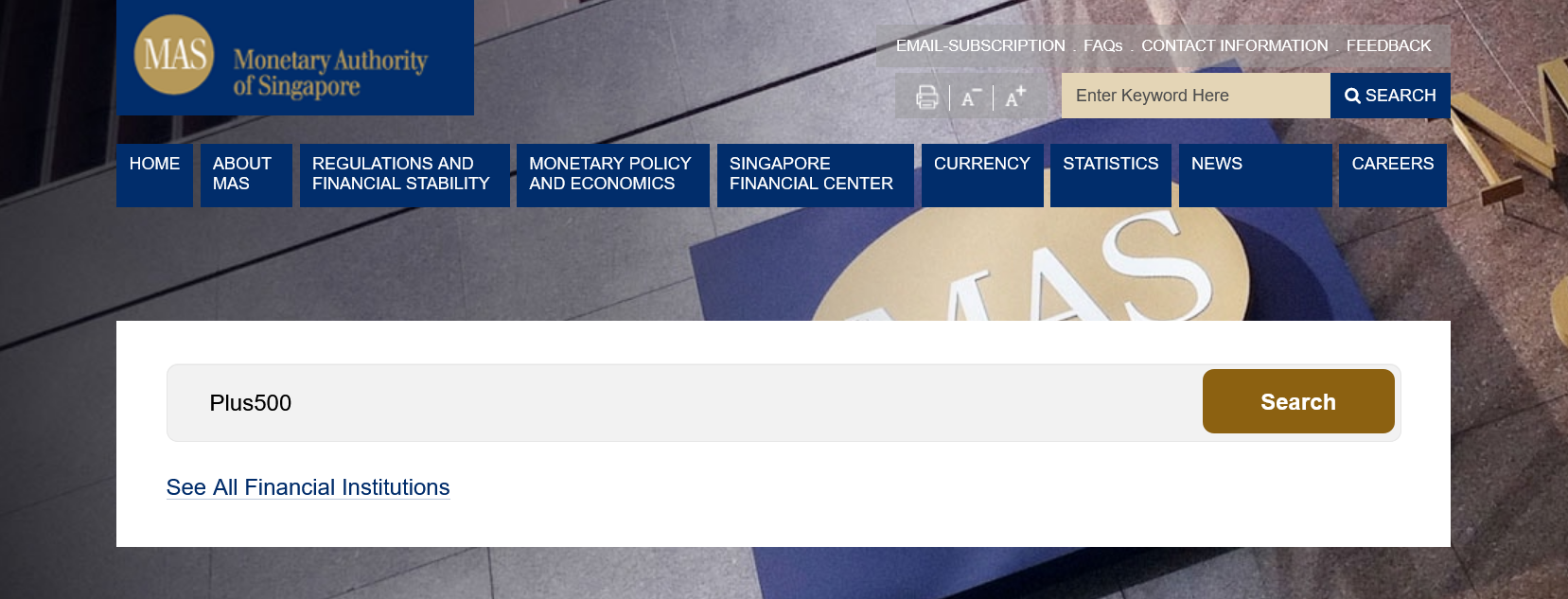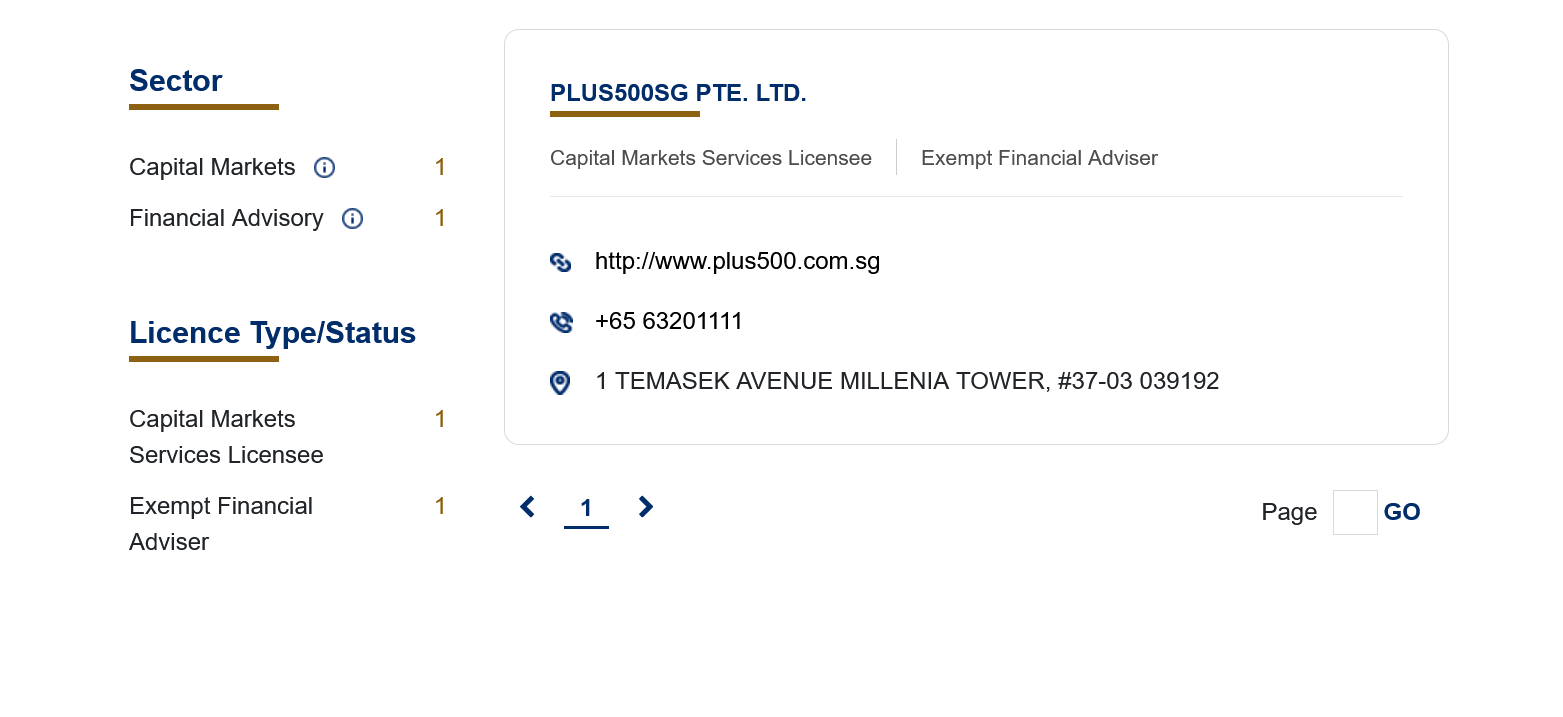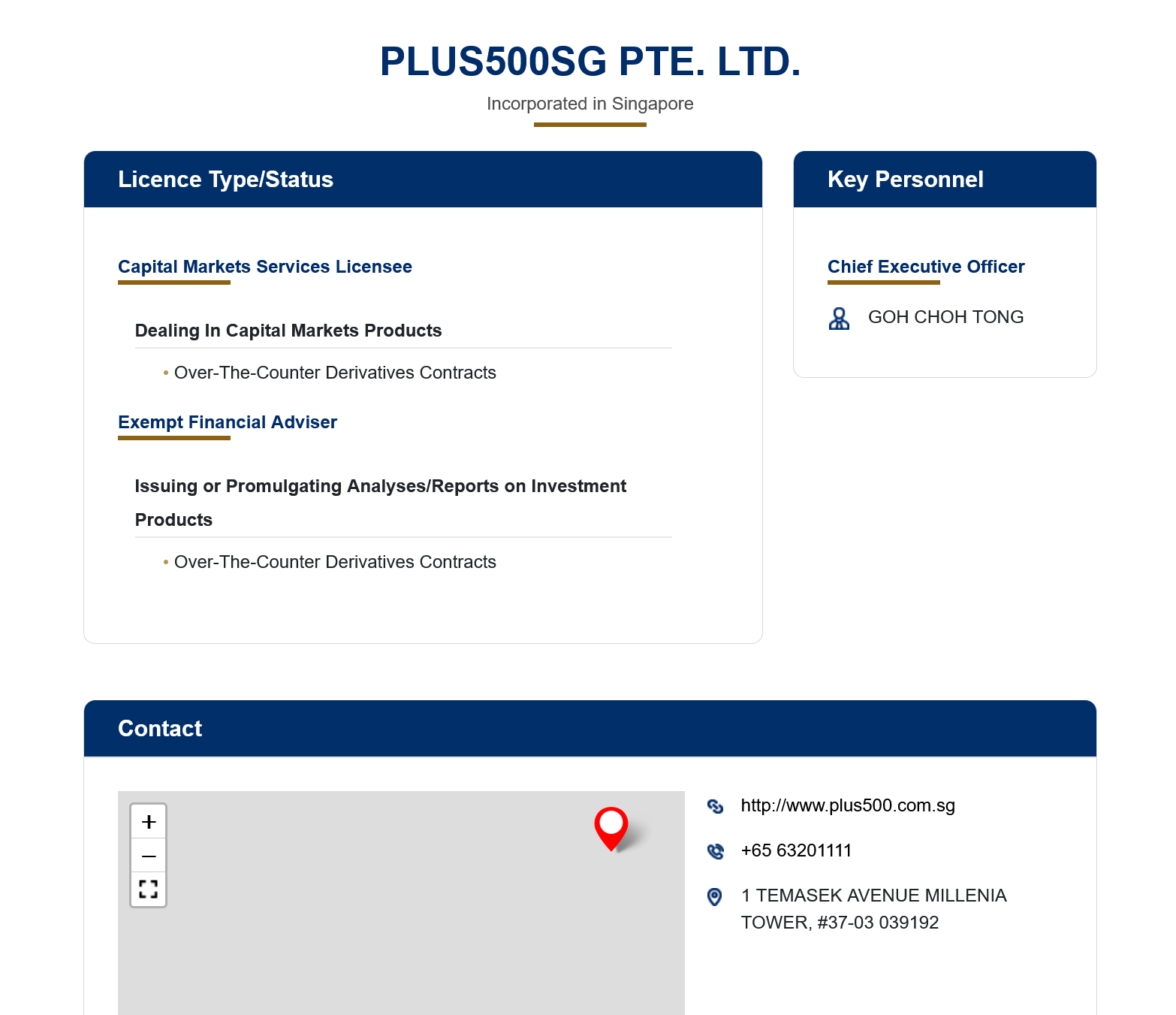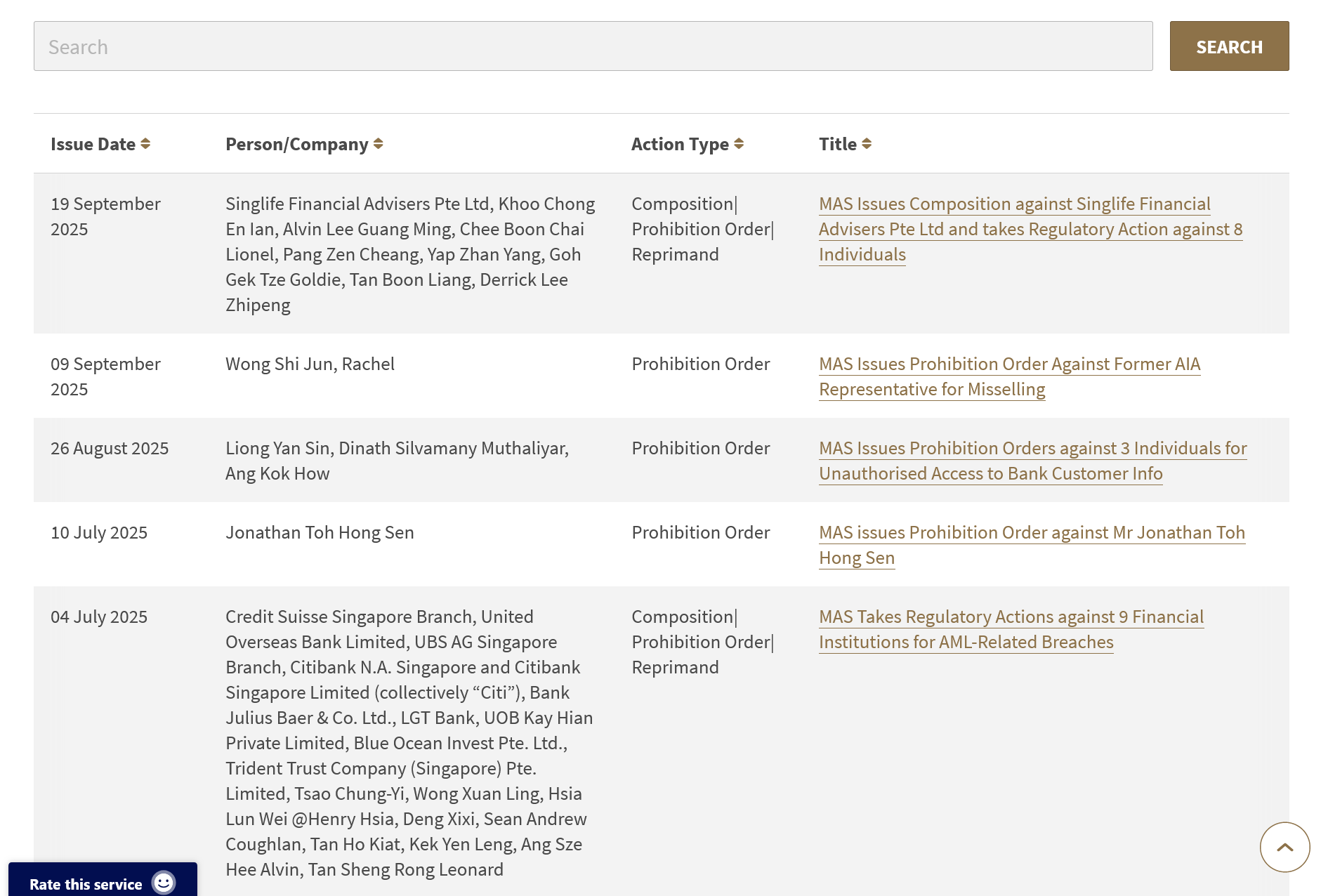Best Monetary Authority of Singapore (MAS) Regulated Brokers 2026
We’ve personally tested and ranked the top brokers regulated by the Monetary Authority of Singapore (MAS), ensuring high standards of trust and reliability.
Royston Wild
Tobias Robinson
James Barra
September 22, 2025
-
1Interactive Brokers (IBKR) is a top brokerage firm offering access to 150 markets in 33 countries and a range of investment services. With 40 years in the field, this company listed on Nasdaq strictly follows the rules set by authorities such as the SEC, FCA, CIRO, and SFC. It's recognized as one of the most reliable brokers for global trading.
-
2
Trust Platform Assets Fees Accounts Research Education Mobile Support 4.3 Moomoo is a regulated trading platform which is controlled by SEC. It provides a simple, cost-effective method to trade in stocks, ETFs, and various assets from China, Hong Kong, Singapore, the US, and Australia. They provide the option for margin trading, along with no deposit account and several bonus options. -
3
Trust Platform Assets Fees Accounts Research Education Mobile Support 3.5 Coinbase, started in 2012 for buying and selling Bitcoin with bank transfers, has grown into a major crypto company. It now offers over 240 crypto assets, advanced trading platforms for investors, is listed on the U.S. Nasdaq, and holds licenses from several regulators. In May 2025, Coinbase became the first crypto firm in the S&P 500, boosting its credibility. -
4
Trust Platform Assets Fees Accounts Research Education Mobile Support 4.1 Plus500, founded in 2008 and based in Israel, is a leading brokerage with more than 25 million registered traders across 50+ countries. The company specializes in CFD trading, provides a user-friendly platform and mobile app, and offers competitive spreads. It does not impose commission, deposit, or withdrawal fees. Plus500 holds the trust of its traders by being licensed by well-known regulators such as FCA, ASIC, and CySEC. -
5
Trust Platform Assets Fees Accounts Research Education Mobile Support 4.7 Established in 1989, CMC Markets is a reputable brokerage firm authorized by various top regulators such as the FCA, ASIC and CIRO, and is listed on the London Stock Exchange. They boast a global client base of over 1 million traders and have received numerous awards.
Compare The Top MAS-Authorized Brokers
Safety Comparison
Compare how safe the Best Monetary Authority of Singapore (MAS) Regulated Brokers 2026 are.
Mobile Trading Comparison
Compare the mobile trading features of the Best Monetary Authority of Singapore (MAS) Regulated Brokers 2026.
Comparison for Beginners
Compare how suitable the Best Monetary Authority of Singapore (MAS) Regulated Brokers 2026 are for beginners.
Comparison for Advanced Traders
Compare how suitable the Best Monetary Authority of Singapore (MAS) Regulated Brokers 2026 are for advanced or professional traders.
Accounts Comparison
Compare the trading accounts offered by Best Monetary Authority of Singapore (MAS) Regulated Brokers 2026.
Detailed Rating Comparison
Compare how we rated the Best Monetary Authority of Singapore (MAS) Regulated Brokers 2026 in key areas.
Fee and Cost Comparison
Compare the cost of trading with the Best Monetary Authority of Singapore (MAS) Regulated Brokers 2026.
Broker Popularity
See how popular the Best Monetary Authority of Singapore (MAS) Regulated Brokers 2026 are in terms of number of clients.
| Broker | Popularity |
|---|---|
| Coinbase |
|
| Plus500 |
|
| Moomoo |
|
| Interactive Brokers |
|
| CMC Markets |
|
Why Trade With Interactive Brokers?
Interactive Brokers is ideal for seasoned traders due to its robust charting platforms, updated data, and adaptability, especially with the IBKR Desktop application. Its exceptional pricing and advanced order features appeal to traders, and its variety of stocks remains unmatched in the market.
Pros
- The TWS platform is designed for intermediate to advanced traders. It includes over 100 order types and a dependable real-time market data feed that rarely experiences downtime.
- Interactive Brokers was named Best US Broker for 2025 by DayTrading.com for its dedication to US traders, ultra-low margin rates, and affordable global market access.
- There's a large selection of free or paid research subscriptions available to all traders. If you subscribe to Toggle AI, you will also receive commission refunds from IBKR.
Cons
- TWS's platform may be difficult for beginners to grasp because of its complexity - we were overwhelmed during our initial tests by the sheer volume of tools, features and widgets.
- IBKR offers many research tools. However, the tools are not uniformly distributed across trading platforms and the web-based 'Account Management' page, causing confusion for the users.
- Only one active session per account is allowed, which means you can't run the desktop version and mobile app at the same time. This can sometimes lead to a frustrating trading experience.
Why Trade With Moomoo?
Moomoo is a great option for beginner and intermediate traders aiming to diversify their investment portfolio. The brokerage's app is easily navigable and the trading fees are significantly low.
Pros
- The broker requires no minimum deposit, making it suitable for beginner traders.
- Moomoo is a licensed entity with the US Securities and Exchange Commission (SEC) and the Monetary Authority of Singapore (MAS).
- The broker provides early access to trading hours before the market opens.
Cons
- The protection against negative balance, a standard security measure at highly regulated brokers, is not available here.
- The broker doesn't offer phone or live chat support, options typically provided by other brokers.
- Regrettably, even with its existing security features, this platform still lacks 2 factor authentication (2FA).
Why Trade With Coinbase?
Coinbase is great for beginners who want an easy-to-use platform to buy and sell various cryptocurrencies, with strong security and regulatory compliance. However, its fees are higher than competitors in our tests, and it’s less suited for short-term traders.
Pros
- Platforms are available for all skill levels: beginners can use the simple Coinbase app, while Advanced Trade offers lower fees and professional tools.
- Coinbase, listed on Nasdaq, complies with strict financial regulations and is licensed in the US, UK, and Europe. It offers security features like FDIC insurance for USD balances (up to $250,000) and two-factor authentication (2FA).
- In 2025, Coinbase Advanced expanded its leveraged trading options with new futures products, including Ripple (XRP), Natural Gas (NGS), and Cardano (ADA), offering more ways to trade, hedge, or diversify.
Cons
- Crypto fees are high based on tests, especially when compared to competitors like Kraken and BitMEX, particularly on the regular trading platform.
- Customer support is frustrating during testing because most help options require login, making it difficult for locked-out users or those without accounts to get assistance.
- Advanced Trade provides TradingView charts but lacks research tools like news feeds, economic calendars, and AI market insights.
Why Trade With Plus500?
Plus500 provides a streamlined experience for traders through a modern and dynamic CFD trading platform. However, its research tools are limited, it charges higher fees compared to some brokers, and its educational resources can be improved.
Pros
- The customer support team reliably offers 24/7 assistance through email, live chat, and WhatsApp.
- Plus500 offers a WebTrader platform specifically made for CFD trading. It presents a neat and straightforward interface.
- The broker provides low-commission trading across various markets, reducing extra fees and attracting experienced traders.
Cons
- Algorithmic trading and scalping are not permitted, potentially discouraging some traders.
- The lack of educational resources adds a challenge for new traders, unlike top-tier brokers like eToro that offer extensive learning materials.
- Compared to competitors like IG, Plus500's research and analysis tools are somewhat limited.
Why Trade With CMC Markets?
CMC Markets offers a great online platform for traders. It has advanced charting tools and a wide variety of CFDs to trade, including a large selection of currencies and customized indices. It caters to traders at all levels.
Pros
- The brokerage excels by offering various useful resources. These include scanners that identify trading patterns, webinars, tutorials, updates from news outlets, and research from esteemed companies like Morningstar.
- CMC Markets introduced an AI News feature, which uses AI to highlight and summarize market stories instead of executing trades for you. This suggests the future direction of broker research tools.
- We upgraded its 'Assets & Markets' rating due to frequent product additions in early 2025, including extended hours trading on US stocks and new share CFDs.
Cons
- A $10 monthly inactivity fee is charged after one year of no trading activity. This could discourage occasional traders.
- The CMC Markets app provides full trading services, but its design and user experience are not as good as leading competitors such as eToro.
- CMC provides a commendable range of assets, but lacks support for actual stock trading and UK customers are unable to trade cryptocurrencies.
Filters
How BrokerListings.com Chose The Top MAS Brokers
To pinpoint the best MAS-regulated brokers in Singapore, we:
- Verified broker claims against the MAS database.
- Ranked providers using our overall ratings, making use of 200+ data-driven metrics and hands-on testing insights.

What Is MAS?
The Monetary Authority of Singapore (MAS) was established in 1971 as the Southeast Asian territory’s central bank. As well as setting monetary policy, its role includes ensuring that local financial markets operate in an efficient, fair and transparent manner.
The MAS “fosters a sound financial services sector through its prudential oversight of all financial institutions in Singapore,” as stated on its website. These organizations include “banks, insurers, capital market intermediaries, financial advisors, and stock exchanges.”
MAS is considered a Category A regulator under BrokerListings’ broker regulator rating system. As in any region, traders should be constantly watchful for fraudulent actors and unscrupulous business practices. But this ranking means that traders in Singapore’s financial markets can deal with confidence.
What Powers Does MAS Have?
According to its website, the MAS is “committed to administering an enforcement regime that fosters high standards of professional conduct and delivers fair and robust enforcement outcomes to deter misconduct and preserve investor confidence.”
The Securities and Futures Act forms the cornerstone of MAS’s regulation of financial brokers and Singapore’s broader capital markets. Under the legislation, companies, such as online brokers, must apply for a license to operate in the local financial services industry.
The regulator can suspend or revoke a firm’s license if it deems rules have been breached. It can also undertake a range of other actions including:
- Imposing financial penalties.
- Removing company directors and other persons who occupy positions of authority or responsibility.
- Prohibiting individuals from operating in Singapore’s financial markets.
- Issuing warnings and letters of advice to offenders.
- Imposing formal reprimands for more serious breaches.
- Referring cases to Singapore’s Attorney-General’s Chambers for criminal investigation.
In July 2025, MAS slapped brokerages UOB Kay Hian and Blue Ocean Invest with financial penalties of S$2.85 million and S$2.4 million respectively.
MAS deemed that the companies had breached money laundering rules, and that both had failed to review transactions deemed suspicious by their own systems. UOB had also failed to take adequate and timely risk mitigation actions after posting two suspicious transaction reports, the regulator said.
MAS also issued prohibition orders on four Blue Ocean Invest executives ranging from three to six years.
What Rules Must A MAS Broker Follow?
The standards financial intermediaries must adhere to are stringent and strictly enforced, and include:
- Seeking the best trading outcome for customers based on factors including “price, costs, speed, likelihood of execution and settlement, size and nature of the order.”
- Ensuring that products and services are suitable for customers.
- Providing “clear relevant and timely information” that allows customers to make informed investment decisions.
- Publishing transparent fee and pricing information.
- Making sure that product information (including marketing materials, product summaries and terms and conditions) “is presented in a fair and balanced manner and easily understood.”
- Segregating customers’ assets from the company’s own, and not using them to meet the broker’s own financial obligations.
- Ensuring that internal policies, systems and business practices “foster fair dealing outcomes for customers.”
- Handling client complaints in a fair, prompt and effective manner.
- Operating recruitment and training practices that ensure that staff are “ethical, fit and proper.”
How Can I Check If A Brokerage Is MAS Regulated?
MAS’s website makes it quick and easy to ascertain a broker’s regulatory status in Singapore. It maintains a comprehensive Financial Institutions Directory that lists all licensed firms in the country.
Let’s say I wish to check that Plus500 has secured a license to trade. I bring up the directory, type the company name into the search field and hit the ‘Search’ button.

Typing Plus500 into MAS’s Financial Institutions Directory. Source: MAS
My search shows that the brokerage is authorized to provide services in the Capital Markets and Financial Advisory sectors.

Finding Plus500 on the Financial Institutions Directory. Source: MAS
Clicking on Plus500’s name provides more information on license type and status; the company’s address, website and contact telephone number; and the names of key personnel.

Plus500’s full profile on the Financial Institutions Directory. Source: MAS
To help traders avoid bad actors, MAS also maintains an Investor Alert List that comprises persons and companies that may be incorrectly perceived as holding a regulatory license.
It also publishes a list of Enforcement Actions against individuals and businesses that have been reprimanded for breaches of local laws and regulations. Records of enforcement actions are kept on the list for five years from the date of publication.

A series of entries on the MAS’s Enforcement Actions List. Source: MAS
Pro tip: If you’re based in Singapore, also check the MAS broker offers an SGD trading account for smooth deposit handling.
Bottom Line
Singapore’s thorough compliance framework for financial services means investors enjoy strong protections from fraud and poor business practices.
However, the Asian country’s regulatory regime isn’t completely watertight, and – as with other tightly regulated regions – bad actors still operate in the country. For this reason, individual traders should always check that the brokerage they’re considering is licensed by the MAS before submitting any personal information or depositing cash.
Article Sources
Monetary Authority of Singapore (MAS)
MAS Takes Regulatory Actions against 9 Financial Institutions for AML-Related Breaches – MAS
Guidelines to MAS Notice SFA 04-N16 Execution of Customers’ Orders – MAS
Guidelines on Fair Dealing – MAS




